This episode will be broadcast on Christmas Eve, which is SO appropriate, because it’s about family.
I’ve always been a little jealous of the great family businesses in the aviation industry – the Mesingers, the Banglesdorfs, the Cutters, and many others.
So, I’m really happy to introduce on of our kids.
Some of you know I was a single Mom for a number of years before we met John, and I was lucky enough to be the Mom of this person.
I couldn’t be prouder of Mickey Gamonal, who has succeeded at so many things on his own – UNLV, the Peace Corps, and lots of jobs and projects. He’s a very talented educator, and now he’s also an entrepreneur – he’s the founder and CEO of Gamonal Tutors. we’ve asked him to be the facilitator of our Book Club this year. I’m also excited to have him do some features on Marketing Math, which I’ve always struggled with.
So, today, we tackle Ken Kupchik’s book, The Sales Survival Handbook.
[embedyt] https://www.youtube.com/watch?v=Zl-W1cjGBVw[/embedyt]
[smart_track_player url=”http://traffic.libsyn.com/aviationmarketing/AMHF_0163_-_Book_Club_-_Sales_Survival_Handbook.mp3″ background=”default” social_linkedin=”true” ]
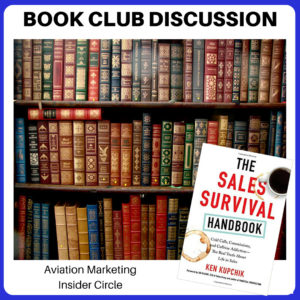 Paula Williams: Today we’re actually interviewing somebody that I know very well, and he’s joining us for our book club. The really cool thing about interviewing your kid is he has to do what you tell him to, so he has to read the books, which is really cool.
Paula Williams: Today we’re actually interviewing somebody that I know very well, and he’s joining us for our book club. The really cool thing about interviewing your kid is he has to do what you tell him to, so he has to read the books, which is really cool.
Paula Williams: Mickey, you just started an entrepreneurial exercise of your own, which is Gamonal Tutoring, right?
Mickey Gamonal: That is correct.
Paula Williams: Fantastic. Tell us about it, and what it is and how to find you, and all those things.
Mickey Gamonal: Excellent. Just recently I started GamonalTutoring.com. I’m the founder and CEO. Essentially I’ve been a tutor for years, but I wanted to get a little more serious about it. Now if you have the time you can check me out on GamonalTutoring.com. I also have a Gamonal Tutoring Facebook, and I printed out some business cards for Gamonal Tutors. It’s all just kind of a work in progress, and it’s cool to have something to kind of back up the legitimacy of my tutoring process.
Mickey Gamonal: Just having a website has gone a long ways, as far as the confidence goes in what I’m capable of. If you don’t have a website yet for your business, I suggest getting one. Not necessarily even to show everyone, but just so that you know what your doing and what your mission is.
Paula Williams: You could get to yours on GamonalTutoring.com or GamonalTutors.com, both go to the same place. That’s cool.
Mickey Gamonal: Yeah.
 Paula Williams: Coming from that kind of background, you’re an entrepreneur. John’s done a little bit of sales. I don’t know that that’s ever been the only hat that you’ve worn, because you’ve always had two or more jobs and sales is just a small part of what I do, so I think all three of us are coming to this from the perspective of sales as a job versus sales as an activity. We think more of it as an activity. Does that sound right?
Paula Williams: Coming from that kind of background, you’re an entrepreneur. John’s done a little bit of sales. I don’t know that that’s ever been the only hat that you’ve worn, because you’ve always had two or more jobs and sales is just a small part of what I do, so I think all three of us are coming to this from the perspective of sales as a job versus sales as an activity. We think more of it as an activity. Does that sound right?
John Williams: I’ve had sales as a job several times.
Paula Williams: That’s true. You did insurance, and you did cars.
John Williams: And real estate.
Paula Williams: And real estate, right, exactly. Now it’s just a side line for you, or at least it’s a part of what you do as an entrepreneur, right?
John Williams: Right.
Paula Williams: Mickey, same thing for you, right?
Mickey Gamonal: That’s correct, yeah. Mostly just trying to hustle my tutoring business, but I think all jobs have a customer service aspect, where basically you have to say why would you provide as a value, which is kind of the basic idea of sales.
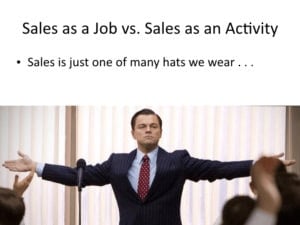 Paula Williams: Exactly. I think all of our jobs, no matter what you do, what is the saying from Francis Lapin, that whatever your job is, you’re in sales, unless you’re a Supreme Court justice or a tenured professor. You always have to convince somebody of something, right?
Paula Williams: Exactly. I think all of our jobs, no matter what you do, what is the saying from Francis Lapin, that whatever your job is, you’re in sales, unless you’re a Supreme Court justice or a tenured professor. You always have to convince somebody of something, right?
Mickey Gamonal: That makes sense. You’re either a purchaser or a seller. If you’re gonna make anything lucrative, it has to be on one side or the other.
Paula Williams: Exactly. From that perspective, we’re all coming from that perspective, what did you think, first impressions of the book, loved it, hated it?
Mickey Gamonal: I thought this book was okay. It was not my favorite book, but I did think there was a lot in it that is relevant to my business from a sales perspective. As far as the book itself goes, it focuses a lot on kind of the levity of sales as a profession, which I can see being something that’s very important to somebody who’s worked in sales for years, you can get bitter, you can get jaded, and you need that kind of laugh, you need to be able to chuckle about how much caffeine you need in the morning, or how difficult your sales manager is to work for, but I think that it’s more geared towards people who are in a sales profession that aren’t selling their own item. It’s for someone who’s maybe selling something they don’t believe in, maybe they’ve been selling for years and they’re jumping from job to job, they’re considering different professions, that sort of thing.
Mickey Gamonal: My first impression of the book was that that’s who the audience is that they’re targeting.
Paula Williams: Right, sales as a job, as opposed to sales as an activity, right?
Mickey Gamonal: Mm-hmm (affirmative). Exactly.
Paula Williams: John, what did you think?
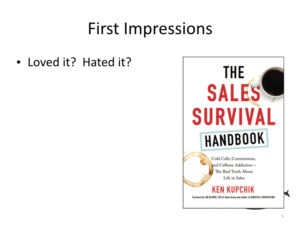 John Williams: I thought it was an old rehash of stuff that’s been around forever, and if you’ve been in sales for a long time you can see through it and maybe get a chuckle here and there, but if you’re new to sales the gems that he has in there here and there are hidden so well that you’re probably not gonna find them.
John Williams: I thought it was an old rehash of stuff that’s been around forever, and if you’ve been in sales for a long time you can see through it and maybe get a chuckle here and there, but if you’re new to sales the gems that he has in there here and there are hidden so well that you’re probably not gonna find them.
Paula Williams: You might miss them if you’re new to sales.
John Williams: Right.
Paula Williams: We have one okay, and one hated it, is that right?
John Williams: Not hated it. You look into it and say yeah, yeah, yeah, okay, fine.
Paula Williams: I’ll say I hated it. It was not my favorite book. I would say of the twelve books we read this year, this was probably my least favorite, and I think it was because of the darkness of the humor and the attitude towards managers, and of course I am a manager so of course I’m gonna feel that way, and also attitude toward prospects, and I think in aviation it’s so much better if you can sit on the same side of the table and look at a problem instead of looking at the prospect on the other side of the table and thinking he is the problem, right? I was not real appreciative of the perspective in the book that I think was pretty prevalent all the way through. That was me, so we’ll talk about some books that I like better when we get to the end.
Mickey Gamonal: It definitely was a little on the cynical side.
Paula Williams: Yeah, I think so too. Jaded, and what were the words you used? There was another one that was really good.
Mickey Gamonal: Jaded, cynical.
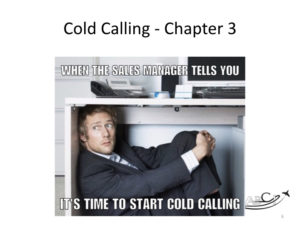 Paula Williams: Dark, right. Okay, cool. The chapter on Cold Calling, that’s actually page 70, that actually was pretty funny, actually, just from the perspective of humor and all, and also it put it in the perspective of the difficulty of cold calling. I think it gives you a pretty good argument not to do it if you can get away with not doing it. I think in our profession, since it’s so small, most people can get away with not doing it. You can always look somebody up on LinkedIn before you call them, and then you know that they’re also a soccer coach, or that they graduated from a particular university, or something about them so it’s not entirely cold, it’s at least a lukewarm call.
Paula Williams: Dark, right. Okay, cool. The chapter on Cold Calling, that’s actually page 70, that actually was pretty funny, actually, just from the perspective of humor and all, and also it put it in the perspective of the difficulty of cold calling. I think it gives you a pretty good argument not to do it if you can get away with not doing it. I think in our profession, since it’s so small, most people can get away with not doing it. You can always look somebody up on LinkedIn before you call them, and then you know that they’re also a soccer coach, or that they graduated from a particular university, or something about them so it’s not entirely cold, it’s at least a lukewarm call.
John Williams: Back in the day, cold calling meant an entirely different thing because it was cold, there was nothing like a warm lead unless you had a personal referral, which didn’t happen. If you’re selling [inaudible 00:08:02] for IBM, they made cold calls all the time. Nowadays, IBM wouldn’t think about doing that. I don’t know, but I would guess not.
Paula Williams: Right. This section on before you start, I thought that was kind of cool. They talk about things you can do before you pick up the phone so you don’t freeze or die or fall under the desk, or anything like that, the things that everybody is afraid of when cold calling.
Mickey Gamonal: I really enjoyed the preparation idea of kind of anticipating the nos, the negatives of why someone would say they don’t want your product, so you’re not stuck like a deer in the headlights of maybe this is not for you. If you’re going to say something is not for them, you should know the reasons why. You should be able to relate to your customer on that because at the end of the day you really want the win-win situations. You want to sell, you want them to be happy with the sale. You want everybody to come away feeling good about the direction that the sale is headed.
Paula Williams: Right. That’s for sure. We always talk about the fact that there are three good answers to a sales call. One is yes, one is no, and one is I need more information. Any of those is a successful end to a sales call. I think people don’t recognize the no as a successful end. You just carry on and say great, if you ever need anything from us in the future, I know you’re in the business, other things are gonna come up, and I’m glad to have met you and learned more about you. That is still a successful conclusion, even if you get a no on that item.
Mickey Gamonal: Absolutely. I think we get caught up in trying to shove our product down our customers’ throat, and you can leave them with a negative outlook. If you can come in trying to get them excited about your product, and if it’s not for them then it’s not for them, that’s the whole point of prospecting, people who are going to need and utilize your product.
Paula Williams: Exactly. You found something out, and that was what you called about was to find out if they’d be a good fit, and if not that’s what you wanted to know.
John Williams: Problem with shoving products down the customers’ throat is that they choke.
Mickey Gamonal: True that.
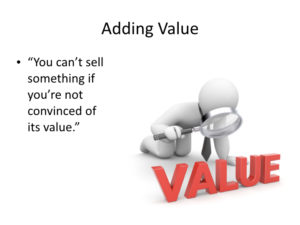 Paula Williams: Right, exactly. You also commented, Mickey, on the adding value. You can’t sell something if you’re not convinced of its value, which I thought was a really insightful thing to say because I think what we feel about what we’re selling communicates itself really clearly to the other person. What no matter what we say or how we comport ourselves, they get the nonverbal communication from that, that this is really a stinker of a deal, or this is really a great product depending on how we feel about it.
Paula Williams: Right, exactly. You also commented, Mickey, on the adding value. You can’t sell something if you’re not convinced of its value, which I thought was a really insightful thing to say because I think what we feel about what we’re selling communicates itself really clearly to the other person. What no matter what we say or how we comport ourselves, they get the nonverbal communication from that, that this is really a stinker of a deal, or this is really a great product depending on how we feel about it.
Mickey Gamonal: Exactly, no preparation, no amount of preparation is going to change a product that somebody doesn’t need into a product that somebody does need. You want to make sure that you’re calling the right people, and it’s going to make a positive impact in their lives or their business.
Paula Williams: Right. Absolutely. Cool. I think this really sums up my problem with the book. If you’re just listening to this, it’s a cartoon, it’s a mime on one side and a clown on the other. It says you’re really a great guy, John, but I think we just have different senses of humor. I think this really is a funny book. It does have some parts in it that are really funny. It hit me the wrong way because of the negativity. Somebody who’s been in the business and maybe is a little bit more into the gallows humor, maybe that’s something that they would more appreciate more than I did. What do you guys think?
Mickey Gamonal: I agree. I think if you’ve been selling the same product for five years, and you’re in a powerless situation where they’re not gonna change the features, they’re not going to give you any pull as far as price, or any control of the deal, the humor is good. It’s gonna hit because you laugh. The only way to get through the day is to laugh about how powerless in this situation you are. Otherwise you’re gonna cry about it. I think that’s pretty accurate.
Paula Williams: If you have a terrible job, the only way to cope is really humor.
Mickey Gamonal: Absolutely.
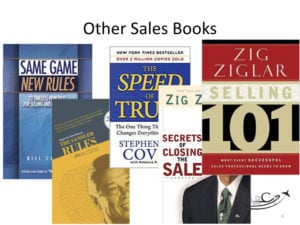 Paula Williams: Cool. Here’s some sales books that I liked better. Bill Kasky, Same Game, New Rules. Very low-key, very business to business oriented. Sandler Rules. John, you know about that one, right?
Paula Williams: Cool. Here’s some sales books that I liked better. Bill Kasky, Same Game, New Rules. Very low-key, very business to business oriented. Sandler Rules. John, you know about that one, right?
John Williams: Yeah. The problem I have with these things is I’ve been to four or five in depth weeks long sales training courses over the years, and then had to go out and make it work. It’s just like, I don’t know, like you might want to take this out or not, but it seemed like he was trying to spin words to sell a book.
Paula Williams: Okay. That’s fair. Another one that I really liked was Steven Covey’s the Speed of Trust, which isn’t really a sales book, but it is a sales book because it’s about getting people to trust you enough to take the next step with them in whatever kind of relationship it is, whether you’re working with them or you’re working for a boss that you’re not getting along with, and you need to get past the distrust. If you’re in a sales job, of course you’ve got a big brick wall of distrust that’s the first thing that …
John Williams: I was speaking of the book we’re reviewing, not the Sandler’s book.
Paula Williams: Okay. Right. Exactly. I was talking about some books that I like better than this one.
John Williams: Just wanted to make clear.
Paula Williams: Okay. Do you want to talk more about this book?
John Williams: No. I just said that’s the one I was referring to, not the one you were talking about.
Paula Williams: Okay. Cool. The next two are ones that we’re actually going to be reviewing in our book club this year, in 2019, Zig Zigler’s Secrets to Closing the Sale, and Selling 101. Those are going to be back to back, so we’ll have some overdose of Zig later this year, and that goes back a ways. These are really considered classics of sales, and I think there’s gonna be a lot of things that we find out that are different than the way sales used to be, because our [inaudible 00:15:13] is different than it used to be as well.
Paula Williams: I’m looking forward to talking about those, as well. Anything more about any of these? Cool. Okay. Thanks for joining us. This was a lot of fun. I think the next book will probably be a lot better. That’s gonna be in fact I have a box of them on the table there that are about to go out in the mail, and that is Gary Banerchuck’s the Thank You Economy. Gary B is not boring. Mickey, you’ve read Gary B before. You have some experience with that. He’s kind of your generation.
Mickey Gamonal: Yeah. Absolutely. I mean and going with that I would say I’ve seen a lot more of him on social media than actually physically picking up a book and reading. Just from the social media, he’s very in your face. Like you say, he’s not boring. He demands attention. Probably one of the loudest guys in the room, but he advocates for being one of the hardest workers in the room as well.
Mickey Gamonal: It’s very important to have someone who is not only loud, you want someone who actually does their research and puts in the work. I believe he’s someone who does that. It might be a little in your face for a lot of the people who enjoy kind of reading commonsense stuff, rather than pay attention to me, pay attention to me, pay attention to me, but it will be a page turner, I’m sure.
Paula Williams: Excellent.
John Williams: He forces you to pause.
Paula Williams: Yeah.
John Williams: Reflect. Even if not right then, you will do it later.
Mickey Gamonal: Exactly. He’s a different kind of cynic. He’s gonna point out those details so that you think about it while you’re doing other things throughout your day, even though at first it just catches you so off guard that you disregard it. It’s something that’ll catch up to you.
Paula Williams: Right. Then you start thinking the next day or even later that day I wonder if he was right. It’ll be interesting to see if the book is anything like his presence on social media, and what you think of that. We also try to alternate sales and marketing, because I know we’ve got both kinds of people, and a lot of people that wear both kinds of hats in our book club. That’s kind of fun to alternate that way. Cool. We’ll be talking next month.
Paula Williams: Also, I’m looking forward to another episode where Mickey is going to do marketing math with us, which is a subject that a lot of us read, but it’s really important to have those equations down and to know your numbers. We’ll talk about some of those things, and Mickey might have some suggestions for us to make that easier.
Mickey Gamonal: Yeah. I’m stoked. As a tutor, I pride myself on breaking things down so that everyone can understand in a simple language. If you’ve ever been hung up on the marketing math or anything like that, hopefully we can get you straightened out there.
Paula Williams: Tell us again how people can get hold of you, Mickey.
Mickey Gamonal: GamonalTutors.com, and GamonalTutors Facebook, those are gonna be my two main marketing projects now. Hop on there, leave me a comment. Reach out to me, say hi. I’m pretty quick at responding to messages. Happy for any support or dissension. Whatever you guys got for me, throw it my way, and I’ll hit you back.
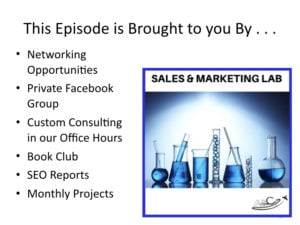 Paula Williams: Absolutely. Right. Again, Micky is also going to be joining us in the sales and marketing lab in our Facebook group, our private Facebook group. If you have any math questions or anything like that, he’ll probably be much more helpful than I’ve ever been. We will talk to you next month.
Paula Williams: Absolutely. Right. Again, Micky is also going to be joining us in the sales and marketing lab in our Facebook group, our private Facebook group. If you have any math questions or anything like that, he’ll probably be much more helpful than I’ve ever been. We will talk to you next month.
John Williams: Have a great time. See you.
Paula Williams: All right.
Mickey Gamonal: Thanks, guys. Take care.
Podcast: Play in new window | Download
Subscribe: Spotify | Amazon Music | RSS




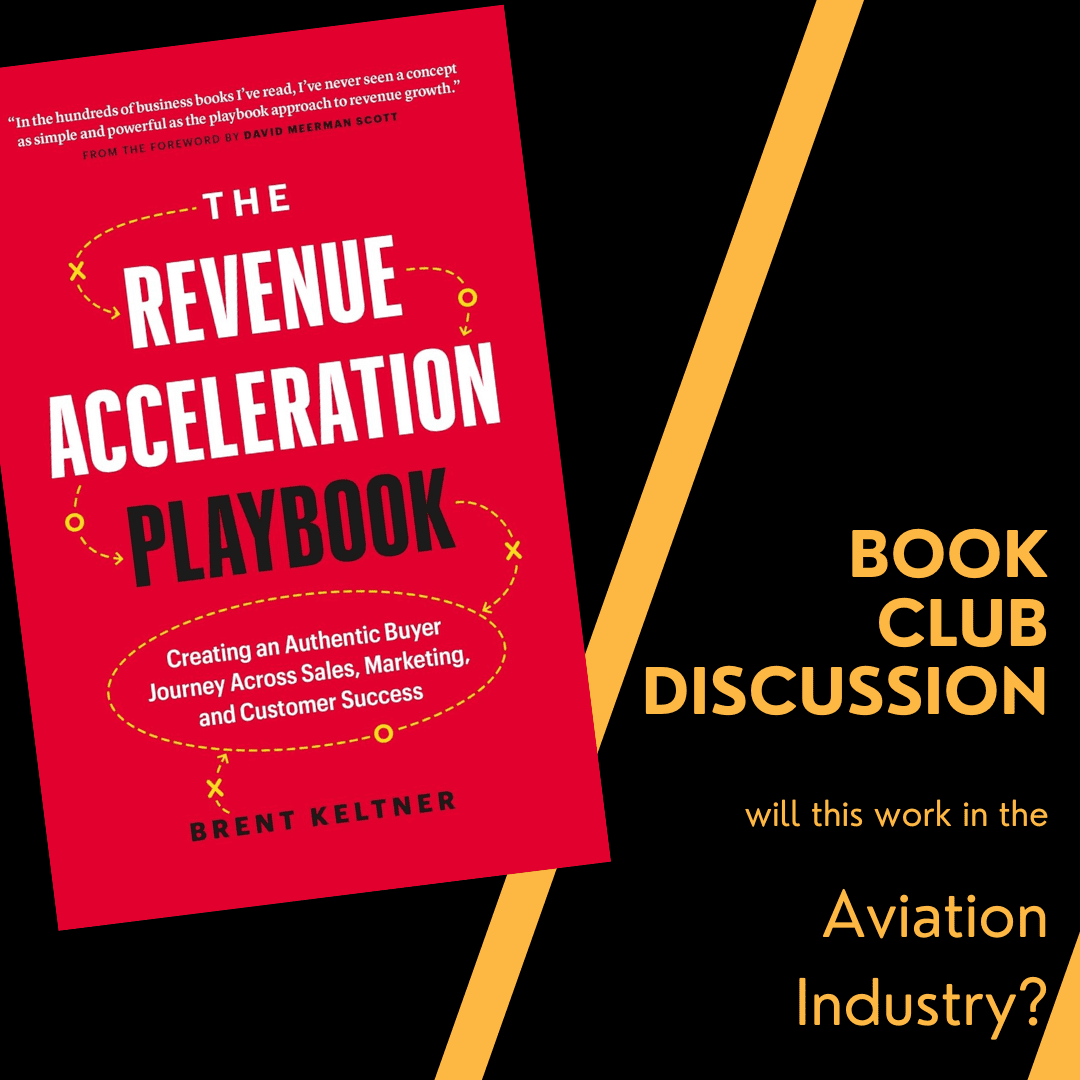
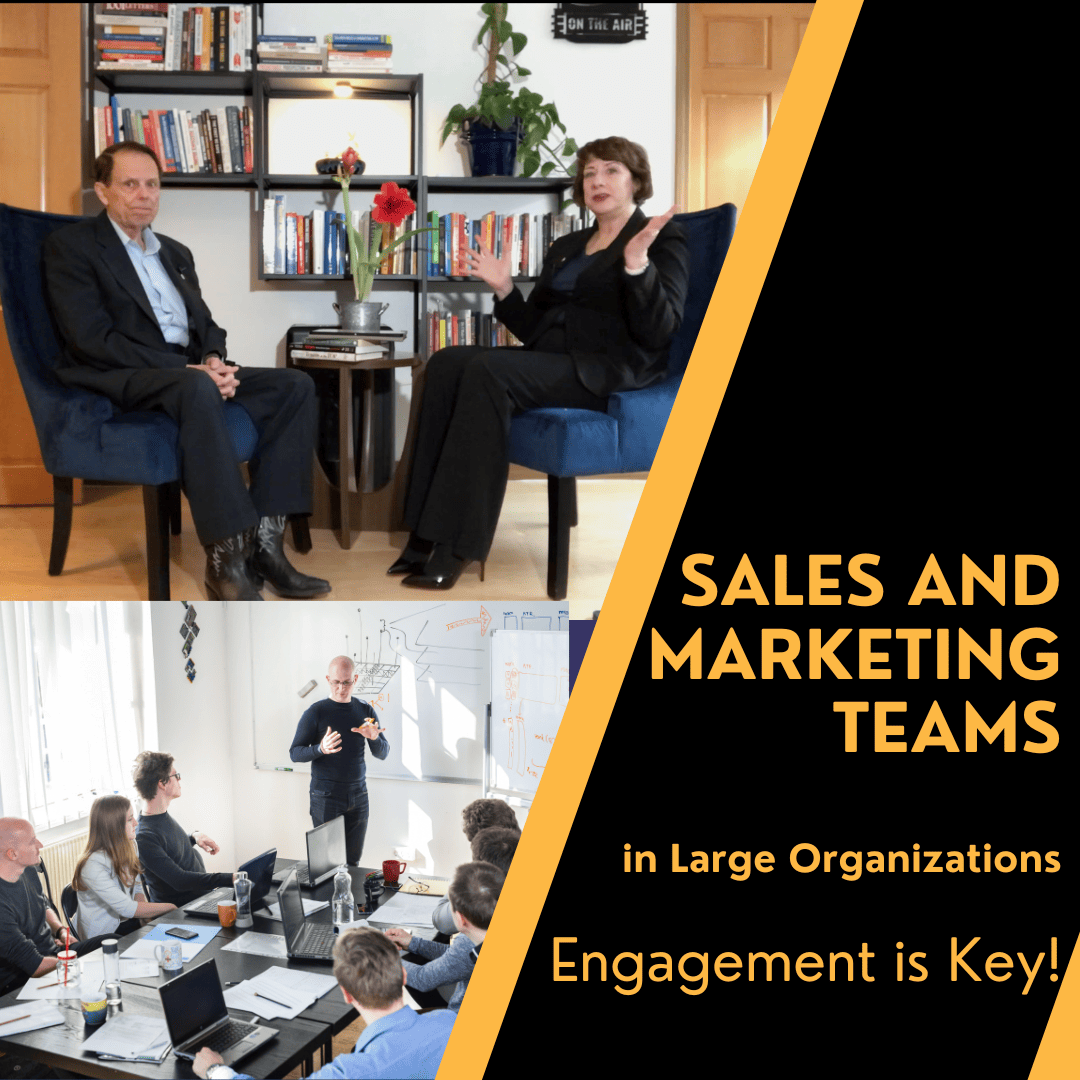
Leave A Comment